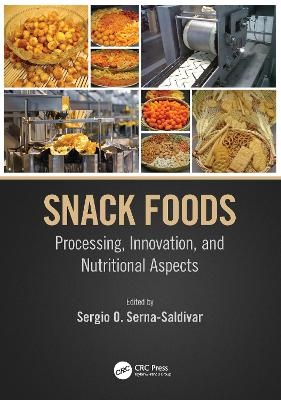
Snack Foods
CRC Press (Verlag)
978-0-367-65351-4 (ISBN)
The diverse segments of the snack industries that generate close to $520 billion of annual sales are adapting to new consumer´s expectations, especially in terms of convinience, flavor, shelf life, and nutritional and health claims. Snack Foods: Processing, Innovation, and Nutritional Aspects was conceptualized to thoroughly cover practical and scientific aspects related to the chemistry, technology, processing, functionality, quality control, analysis, and nutrition and health implications of the wide array of snacks derived from grains, fruits/vegetables, milk and meat/poultry/seafood.
This book focuses on novel topics influencing food product development like innovation, new emerging technologies and the manufacturing of nutritious and health-promoting snacks with a high processing efficiency. The up-to-date chapters provide technical reviews emphasising flavored salty snacks commonly used as finger foods, including popcorn, wheat-based products (crispbreads, pretzels, crackers), lime-cooked maize snacks (tortilla chips and corn chips), extruded items (expanded and half products or pellets), potato chips, peanuts, almonds, tree nuts, and products derived from fruits/vegetables, milk, animal and marine sources.
Key Features:
Describes traditional and novel processes and unit operatios used for the industrial production of plant and animal-based snacks.
Depicts major processes employed for the industrial production of raw materials, oils, flavorings and packaging materials used in snack food operations.
Contains relevant and updated information about quality control and nutritional attributes and health implications of snack foods.
Includes simple to understand flowcharts, relevant information in tables and recent innovations and trends.
Divided into four sections, Snack Foods aims to understand the role of the major unit operations used to process snacks like thermal processes including deep-fat frying, seasoning, packaging and the emerging 3-D printing technology. Moreover, the book covers the processing and characteristics of the most relevant raw materials used in snack operations like cereal-based refined grits, starches and flours, followed by chapters for oils, seasoning formulations and packaging materials. The third and most extensive part of the book is comprised of several chapters which describe the manufacturing and quality control of snacks mentioned above. The fourth section is comprised of two chapters related to the nutritional and nutraceutical and health-promoting properties of all classes of snacks discussed herein.
Sergio O. Serna Saldivar is full professor of the School of Sciences and Engineering and head of CIDPRO at Tecnologico de Monterrey. Prior to this, he was research scientist at the Soil & Crop Sci. Dept. at Texas A&M, consultant for EMBRAPA at Río de Janeiro, Brazil and associate professor for the University of Sonora where he was recently awarded with a Doctor Honoris Causa. He is currently the research chair leader regarding nutraceuticals associated to cereal and other grains. He has been a member of the American Association of Cereal Chemists for over 30 years and the Institute of Food Technologists and has acted as associate editor for the journals of Cereal Chemistry and Cereal Science. He was a member of the AACC International Board of Directors. He received his BS in Animal Science/Agricultural Engineering from ITESM and his M.Sc. and Ph.D degrees in Scientific Nutrition and Food Sci. & Tech. from Texas A&M. He has published 12 books, 52 chapters, 248 referred journal articles, 16 encyclopedia articles and is inventor of ten registered patents and four patent applications and codeveloper of the wheat variety TAM-202. His scientific and book publications have more than 9500 citations with a H factor of 50 according to google scholar. He has more than 330 presentations in international and national conferences and symposiums. He has directed 70 MSc and 20 PhD students. His research interests focus on biotechnology of cereal grains, legume seeds, snack foods, mycotoxins, nutraceutical properties of grains and indigenous Mexican foods and vegetable proteins. He belongs to the maximum category of the Mexican National Research System and the Mexican Academy of Sciences. In addition, he was granted the "Luis Elizondo" award in Agricultural and Food Industries, the 2004 AACC Excellence in Teaching award, the Yum Kax 2008 award for his contributions to the science and technology of nixtamalized products and the AgroBio México 2012 national award in agrobiotechnology and six times the Teaching and Research Award at Tecnologico de Monterrey.
Overview and State of the Art of the Snack Food Industry. Application of Traditional and Emerging Processes. Industrial Frying and Seasoning Operations. Packaging of Snack Foods. 3D-Printed Snacks. Production of Cereal-Based Raw Materials for the Snack Industry. Production and Properties of Fats and Oils. Seasonings for Snack Foods. Popcorn and Other Puffed Grains. Production of Wheat-Based Snacks. Alkaline-Cooked Snack Foods. Production of Snacks by Extrusion Cooking. Snacks Based in Legumes, Pseudocereals and Other Seeds. Snacks from potatoes. Almonds and Tree Nuts. Snacks from Fruits and Vegetables. Dairy-Based Snacks. Snacks from Animal, Poultry and Sea Foods. Quality Control and Assurance in the Snack Food Industry. Nutritional Composition and Toxic Compounds of Snack Foods. Nutraceutical and Health Implications of Snack Foods.
| Erscheinungsdatum | 09.03.2022 |
|---|---|
| Zusatzinfo | 96 Tables, black and white; 79 Line drawings, black and white; 18 Halftones, black and white; 97 Illustrations, black and white |
| Verlagsort | London |
| Sprache | englisch |
| Maße | 178 x 254 mm |
| Gewicht | 1138 g |
| Themenwelt | Technik ► Lebensmitteltechnologie |
| ISBN-10 | 0-367-65351-6 / 0367653516 |
| ISBN-13 | 978-0-367-65351-4 / 9780367653514 |
| Zustand | Neuware |
| Haben Sie eine Frage zum Produkt? |
aus dem Bereich


